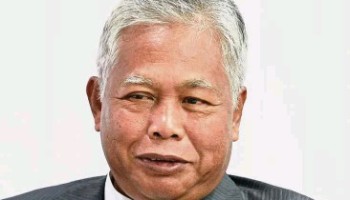 |
| Najib and Mahathir face off in fierce Malaysian election: https://news.cgtn.com/news/ |
https://youtu.be/dbCkQ9347-A
Dr M must now walk the talk
WHEN I attended an election rally of Pakatan Harapan in Wangsa Maju, Kuala Lumpur, two weeks ago, I was delighted to see the Malays, Indians and Chinese clapping hands in unison when PKR’s vice-president Tian Chua promised that the coalition would look after the interests of all, regardless of race, once it came into power.
I was touched by the reactions on the ground. It was a good feeling to be among people who share similar aspirations for racial harmony and welfare for all in this multiracial country.
My son also had the same experience at a Pakatan ceramah in Hulu Kelang, Selangor, last week.
It was drizzling and he was soaked. Then a Malay man gave him a shirt to change. He came home telling me he hoped that Pakatan would win to bring back the long-lost spirit of muhibbah and unity.
The spirit of muhibbah had for a long time turned into a rare commodity because the authorities allowed political opportunists to disrupt peace with their disparaging remarks against other communities and religious groups.
Now that Pakatan has toppled the Barisan Nasional government led by Datuk Seri Najib Tun Razak in the May 9 general election, it is natural for Malaysians like me and my son to expect a better tomorrow where divisive racist politics is curbed, if not eliminated.
I look forward to the return of the good old days when the spirit of muhibbah among races prevailed.
This expectation is not unrealistic, given the emphasis to multiracialism and unity in the speeches of leaders under Pakatan led by Tun Dr Mahathir Mohamad.
The former premier, once disliked by some Chinese for his past racist rule but who appears to have repented, is now the Prime Minister.
But as Dr Mahathir, who has galvanised almost all Opposition forces against Najib for the latter’s association with the 1MDB (1Malaysia Development Bhd) controversy, is likely to play a key part in governing and “saving” the country, his policy speeches made during campaign are in focus now.
While Dr Mahathir has promised to get rid of corruption in government and Felda, he has also pledged to remove the 6% Goods and Services Tax (GST) and reintroduce fuel subsidies – two issues that have impacted the lower-income group negatively.
But if GST is removed and fuel subsidies are reinstated, Dr Mahathir’s government will have to implement measures to ensure that Malaysia’s fiscal position will not be undermined by populist moves.
With the prices of oil and gas returning to a four-year high, the impact on government finance may be cushioned slightly this year. But for the longer term, sustainability is in doubt.
Indeed, international rating agency Moody’s cautioned yesterday that these campaign promises, if implemented without any other adjustments, would be “credit negative for Malaysia’s sovereign”.
A downgrade in sovereign rating will have a negative impact on the ringgit, interest rates and ranking of our bonds.
It may also affect foreign portfolio investments.
But as Dr Mahathir is a deft hand at crisis management, having led the country out of the 1986 recession and 1998 Asian financial and local political crisis, he should have the wits to forestall any fiscal shortfall.
With many businessmen and economists silently supporting Pakatan, there should be no shortage of talent to help him manage the economy.
These skilled people may emerge in the open soon.
What worries businessmen and economists most is the doctor’s pledge that China investments in Malaysia would be reviewed, and terminated if there were unfair terms in current contracts.
But as Selangor and Penang have attracted substantial direct investments from China, PKR’s Datuk Seri Azmin Ali and DAP’s Lim Guan Eng could present an objective and clearer picture of Chinese investments to Dr Mahathir.
While it is difficult to revoke the East Coast Rail Link (ECRL) due to the vast economic benefits it can bring to the country and the favourable terms in loan repayment, it is easier for Malaysia to delay the implementation of the Kuala Lumpur-Singapore high-speed rail project or stop China from getting the contract.
But before doing anything drastic to cut down national debt, government lawyers have a duty to advise the chief commander on paying vast compensation for breach of contract. As China views Malaysia as a strategic location in its ambitious Belt and Road Initiative, Beijing has been following the political developments closely.
But to be sure, Dr Mahathir was a business-friendly leader when he was the Prime Minister, the first time around.
He was responsible for allowing direct trade between Malaysia and China in the late 1980s, which led to China becoming our largest trading partner. Hence, he is not expected to make policies detrimental to the economy.
One question many people are asking now is: will Malaysia become more democratic under Pakatan rule?
From the campaign speeches made by the coalition’s strategists and Dr Mahathir, this appears to be so – at least for the foreseeable future.
Two PKR vice-presidents, Rafizi Ramli and Tian Chua, have told voters that if one day Pakatan becomes corrupt, the people should vote the coalition out – just like how they brought Najib down.
What Pakatan wants to see is a two- or three-party political system where people have a choice to pick the best among the contenders.
Since Malaysians have boldly voted out Barisan that ruled for over six decades, there is no reason why Pakatan cannot be toppled if it is corrupted by power and greed.
In the campaign speeches, Dr Mahathir promised that he would pass the baton to Datuk Seri Anwar Ibrahim, who will be released from jail next month.
Will he keep this promise after assuming the powerful post?
The logical answer is he will. At 93, his health may not permit him to carry on with this high-pressured job.
It will also be politically unwise for him to stay beyond his welcome, as Anwar had originally been the choice of the coalition before Dr Mahathir came into the picture.
Many have high expectations of Anwar, who has the experience of an acting premier, deputy premier and finance minister before he was sacked from the Cabinet in 1998 by Dr Mahathir.
Having survived bitter political battles and endured imprisonments under Dr Mahathir and Najib from 1998 until now, Anwar should understand the people’s needs better and rule with a multiracial outlook.- by Ho Wah Foon The Star
Related:
Why Malaysia's opposition coalition won the election
https://youtu.be/bX1JGnGr7t
By The Star Says
By Joceline Tan
'Economy and finance are our main focus' - Nation
All eyes on Pakatan financial policies - Business News
Possible headwinds from mega project review - Business News
Related posts:

Mahathir to be sworn in as PM on May 10 2018. After six decades in power, BN falls to ‘Malaysian tsuna...























